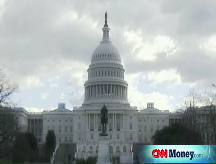Stimulus: And now a Senate fight
In his second week in office, president fought hard for bipartisan support for the economic stimulus package. He won a vote but got no Republican support.

NEW YORK (CNNMoney.com) -- President Obama faces a tough week: The calls are growing louder for a new bank and housing bailout, and the Senate will take up its version of the economic stimulus package.
And if last week is any gauge, the critical Republican votes he needs likely won't come easily.
Obama, in his second week in office, pushed the ball forward in a few key areas. On Monday, he signed clean energy directives and won Senate confirmation of his Treasury Secretary. Two days later, the House passed an $819 billion stimulus bill.
But the House legislation failed to gain a single Republican vote, despite the president's hard lobbying for bipartisan support. The final House vote on the stimulus bill was 244 to 188, with 11 Democrats voting against it.
"I hope that we can continue to strengthen this plan before it gets to my desk," Obama said after the vote. "We must move swiftly and boldly to put Americans back to work, and that is exactly what this plan begins to do."
CNNMoney.com will continue to track Obama's first 100 days in office and keep score of the government's unprecedented efforts to fix the ailing economy. (Last week's article is available here.)
Lobbying for votes: Obama worked hard all week to gather support for Wednesday's vote. On Saturday, he dedicated his weekly address to the stimulus bill, calling for "unprecedented action" on the economic crisis.
On Monday, Obama cited the tens of thousands of job cuts that companies had just announced, arguing that a stimulus bill with the aim of creating millions of jobs is needed immediately.
"Over the last few days, we've learned that Microsoft, Intel, United Airlines, Home Depot, Sprint Nextel and Caterpillar are each cutting thousands of jobs," Obama said. "We owe it to each of them and to every single American to act with a sense of urgency and common purpose."
The president then met with House and Senate Republicans on Tuesday, pleading for GOP votes. In an attempt to put to rest a popular Republican attack point, Obama asked House Democrats to remove some of the more controversial elements of the bill, including an elimination of a waiver requirement for states to receive federal aid for family planning services.
In a last-ditch effort to gain public and lawmakers' approval, Obama on Wednesday morning met with a dozen CEOs who pledged their support for the bill.
Senate push begins: After the House vote, and with a Senate vote looming this coming week, Obama continued his push on Friday. The president cited the government GDP report that showed the economy shrunk by the most in 26 years in the fourth quarter of 2008.
But without a filibuster-proof majority, Senate Democrats will likely be unable to pass their version of the stimulus bill unless they muster at least two Republican votes. That could prove a tall task for Obama, as Senate Republicans are already voicing strong opposition to the bill.
"Republicans are using their leverage to get Senate Democrats to the negotiating table," said Dan Clifton, the head of policy research at Strategas Research Partners. "Senate Democrats are going to have to accept some Republican amendments if they want the bill to pass."
Clifton said the bill has a high probability of passing, even though Republicans will take a hard-line approach in the days leading up to the vote.
Geithner gets confirmed: The president also faced some difficulty in getting his Treasury secretary, Tim Geithner, confirmed. Obama and Senate Democrats had pushed for a quick confirmation of Geithner, citing a need for quick action on the economy.
But Geithner's failure to pay some taxes earlier this decade raised some eyebrows among Senate Republicans, leading to a drawn-out confirmation hearing and vote that eventually passed 60 to 34.
This coming week, Geithner could move forward on elements of a new bank bailout plan. The rescue is likely to include a program that would relieve banks of troubled assets, and may also feature promises for additional capital infusions or an offer to guarantee the value of some bank holdings.
Scolding Wall Street: After the New York comptroller's office reported on Thursday that bonuses in 2008 totaled $18.4 billion, Obama and Geithner lashed out against companies that continued to issue huge bonuses while receiving billions in funding from the Treasury's Troubled Asset Relief Program.
"That is the height of irresponsibility. It is shameful," Obama said Thursday.
Energy action: Obama on Monday directed the Environmental Protection Agency to review a California application to regulate greenhouse gases. He also told the U.S. Department of Transportation to begin implementing fuel efficiency standards passed in late 2007 but not implemented by the Bush administration.
Before signing the directives, Obama lobbied again for action on stimulus, citing the billions of dollars of renewable energy investment in the bill.
"No single issue is as fundamental to our future as energy," Obama said Monday. "It is time for this moment of peril to be turned into one of progress." ![]()


